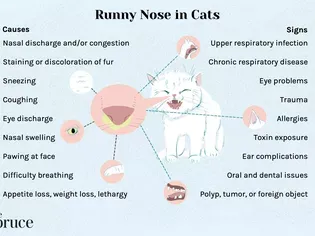Runny Nose in Cats: Causes and Treatment
Updated on 04/26/24

Runny Nose in Cats: Unveiling the Causes and Finding Relief
Every pet owner's heart sinks when they see their beloved feline friend with a runny nose. This common feline ailment can be a nuisance for your furry companion and a source of worry for you. Understanding the underlying causes and effective treatments for a runny nose in cats is crucial for ensuring their well-being.
Causes: Exploring the Possible Culprits
1. Upper Respiratory Infection (URI): The most prevalent cause of a runny nose in cats is an upper respiratory infection (URI), often referred to as "cat flu." This viral condition affects the upper respiratory tract, including the nose, throat, and sinuses. Symptoms typically include sneezing, nasal discharge, and watery eyes.
2. Allergies: Cats, like humans, can develop allergies to various substances in their environment, such as pollen, dust, and cigarette smoke. When exposed to an allergen, a cat's immune system overreacts, leading to inflammation and nasal discharge.
3. Foreign Objects: Curious cats may accidentally inhale or ingest small objects like grass blades or pieces of string. These foreign objects can irritate the nasal passages and cause a runny nose.
4. Tumors: Nasal tumors, although rare in cats, can obstruct the nasal passages and result in a runny nose. If your cat's nasal discharge is accompanied by other symptoms, such as difficulty breathing or facial swelling, seek veterinary attention promptly.
5. Dental Disease: Dental problems, like infected teeth or gingivitis, can cause inflammation and nasal discharge. The proximity of the mouth and nose allows bacteria from oral infections to spread to the nasal cavity.
Treatment: Restoring Your Feline Friend's Comfort
1. Antiviral Medications: URIs caused by viruses usually run their course within 7-10 days. However, antiviral medications can alleviate symptoms and shorten the duration of the infection.
2. Antibiotics: Bacterial URIs or secondary infections require antibiotics to eliminate the underlying bacteria. Your veterinarian will prescribe the appropriate medication based on bacterial culture results.
3. Antihistamines: Antihistamines can help reduce nasal discharge and relieve allergy symptoms. However, they should only be used under veterinary supervision to avoid potential side effects.
4. Nasal Decongestants: Nasal decongestants can provide temporary relief from nasal congestion. However, they should be used cautiously as they can cause rebound congestion if used for extended periods.
5. Steam Therapy: Steam therapy can help thin nasal secretions, making them easier to expel. Place a humidifier in the room where your cat spends most of their time or run a hot shower and let the steam circulate in the bathroom with your cat present for 10-15 minutes.
Home Remedies: Supporting Your Cat's Recovery
Apart from veterinary treatment, several home remedies can help alleviate your cat's runny nose symptoms:
1. Provide Plenty of Fluids: Encourage your cat to drink plenty of fluids to stay hydrated and thin nasal secretions. Offer fresh water at all times.
2. Elevate Food and Water Bowls: Raising your cat's food and water bowls can help reduce nasal congestion by promoting drainage.
3. Use a Humidifier: A humidifier can add moisture to the air, making it easier for your cat to breathe and thin nasal secretions.
4. Wipe Away Nasal Discharge: Gently wipe away any nasal discharge from your cat's nose using a soft, damp cloth. This helps prevent crusting and discomfort.
Prevention: Safeguarding Your Cat's Respiratory Health
While not all causes of a runny nose in cats are preventable, certain measures can help reduce the risk:
1. Vaccinate Against URI: Vaccinations against feline herpesvirus and calicivirus, common causes of URI, are essential for protecting your cat from these highly contagious infections.
2. Minimize Exposure to Allergens: If your cat has allergies, identify and minimize their exposure to allergens. This may involve using air purifiers, avoiding exposure to pollen during certain seasons, or changing cat litter brands.
3. Maintain Dental Health: Regular veterinary checkups and dental cleanings can help prevent dental disease and reduce the risk of nasal discharge caused by oral infections.
Conclusion: Empowering Cat Owners with Knowledge
A runny nose in cats can be a distressing experience for both the cat and the owner. By understanding the various causes and effective treatments, you can provide your feline companion with the necessary care and support. Remember, consulting with your veterinarian is always advisable to determine the underlying cause and receive the most appropriate treatment plan for your cat.
Explore More Pets

Cat Behavior Problems
How to Stop Aggression in Kittens

Long-Haired Cat Breeds
Siberian Cat: Breed Profile, Characteristics, & Care

Cat Behavior Problems
How to Stop Kittens From Scratching and Biting

Long-Haired Cat Breeds
Turkish Angora: Cat Breed Profile, Characteristics & Care

Basic Training
How to Socialize Your Kitten

Short-Haired Cat Breeds
Cute Pictures & Facts About Calico Cats & Kittens

Litter Box Training
Training Your Kitten to Use the Litter Box

Long-Haired Cat Breeds
10 Fun Facts About White Cats